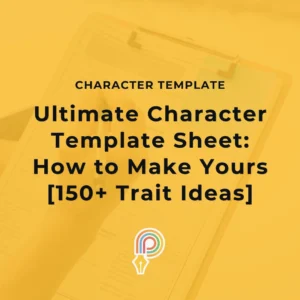
Marcel Proust Questionnaire: 35 Questions for Deep Characters
- Published: March 11, 2024
- Updated: December 23, 2024
- Leave a Comment
Crafting complex, relatable people is hard, and there are no shortcuts to creating believable depth. The Marcel Proust Questionnaire, though, makes it easier to get to know your cast. Read on to learn how Plottr can help you build an ensemble for your next story with the help of 35 revealing character interview questions.
Table of Contents
What is the Marcel Proust Questionnaire?
Marcel Proust was a French novelist, known primarily for his masterpiece In Search of Lost Time, first published in English volumes between 1922 and 1937.
The Marcel Proust Questionnaire is a list of questions that Proust used to explore the inner workings of his friends’ minds.
The questionnaire is designed to delve deep into an individual’s psyche. The probing questions on subjects such as virtues, literary interests, hopes, and dreams are sure to reveal insights that might otherwise have taken years of small talk to learn.
In Proust’s time, creating “confession albums” was a popular pastime. These were journal-like books, often used as a way for friends and confidants to get to know one another. Interviewers still use the Marcel Proust Questionnaire often, such as this interview by Vanity Fair with author Judy Blume.
3 Reasons to Use the Marcel Proust Questionnaire
Just as the Marcel Proust Questionnaire gives eye-opening insight into the inner thoughts of authors and artists we admire, it is also helpful for writers who want to uncover more about their characters.
Use the Marcel Proust Questionnaire as a basis for character interview questions. It will help you:
1. Explore your characters’ backstories.
A person’s past experiences help to define who they are today. Readers know this, and your characters’ personalities and psychologies should be informed by their histories, just like us.
Asking the thirty-five questions (more on these below) of your characters and thinking through their responses is an invaluable exercise. It will help you find nuanced character details and put a sense of lived experience into your story.
2. Reveal the tone and content of your characters’ inner dialogue.
Answering the Marcel Proust questionnaire encourages introspection and self-reflection. Completing the questions from your characters’ perspectives creates a playground to explore their inner worlds. This will help you find their internal conflicts, desires and fears.
3. Create consistency across your characters’ thoughts, emotions, and behaviors.
With that inner world defined, you’ll learn your characters’ true voices. Knowing what your characters want, think, and feel will lend more realism and consistency to their conversations, reactions, emotions, and choices.
The character interview questions are useful whether you’re writing a novel, short story, or screenplay. Keep reading for examples and how to use the template in Plottr.
Meet The Marcel Proust Questionnaire Character Template
The comprehensive list of all 35 questions in Plottr may look overwhelming, but you don’t have to use them all. You could answer whichever questions resonate most with the themes of your story first.
In the character template, you’ll find the full list of questions (and can save each character’s notes into a helpful story or series bible).
To add some structure to the list below, we’ve grouped the questions into four categories. This should help you plan and focus your character interview on the aspects of your cast that matter most to your plot.
Personal Traits and Views
-
- What is your idea of perfect happiness?
-
- What is the trait you most deplore in yourself?
-
- What do you most dislike about your appearance?
-
- What is your greatest fear?
-
- What is your most marked characteristic?
-
- What do you consider the most overrated virtue?
-
- Which talent would you most like to have?
-
- What is it that you most dislike?
-
- What is the trait you most deplore in others?
-
- What is the quality you most like in a man?
-
- What is the quality you most like in a woman?
Life Experiences and Goals
-
- What is your motto?
-
- What is your favorite occupation?
-
- How would you like to die?
-
- What is your greatest regret?
-
- What or who is the greatest love of your life?
-
- What is your current state of mind?
-
- Where would you most like to live?
-
- If you could change one thing about yourself, what would it be?
-
- When and where were you happiest?
-
- What do you regard as the lowest depth of misery?
-
- On what occasion do you lie?
-
- What do you consider your greatest achievement?
-
- If you were to die and come back as a person or a thing, what would it be?
Relationships and Social Aspects
-
- Which living person do you most admire?
-
- Which words or phrases do you most overuse?
-
- Who is your fictional hero?
-
- What do you most value in your friends?
-
- Which living person do you most despise?
-
- Who are your heroes in real life?
-
- Which historical figure do you most identify with?
Interests and Preferences
-
- What are your favorite names?
-
- What is your most treasured possession?
-
- What is your greatest extravagance?
-
- Who are your favorite writers?
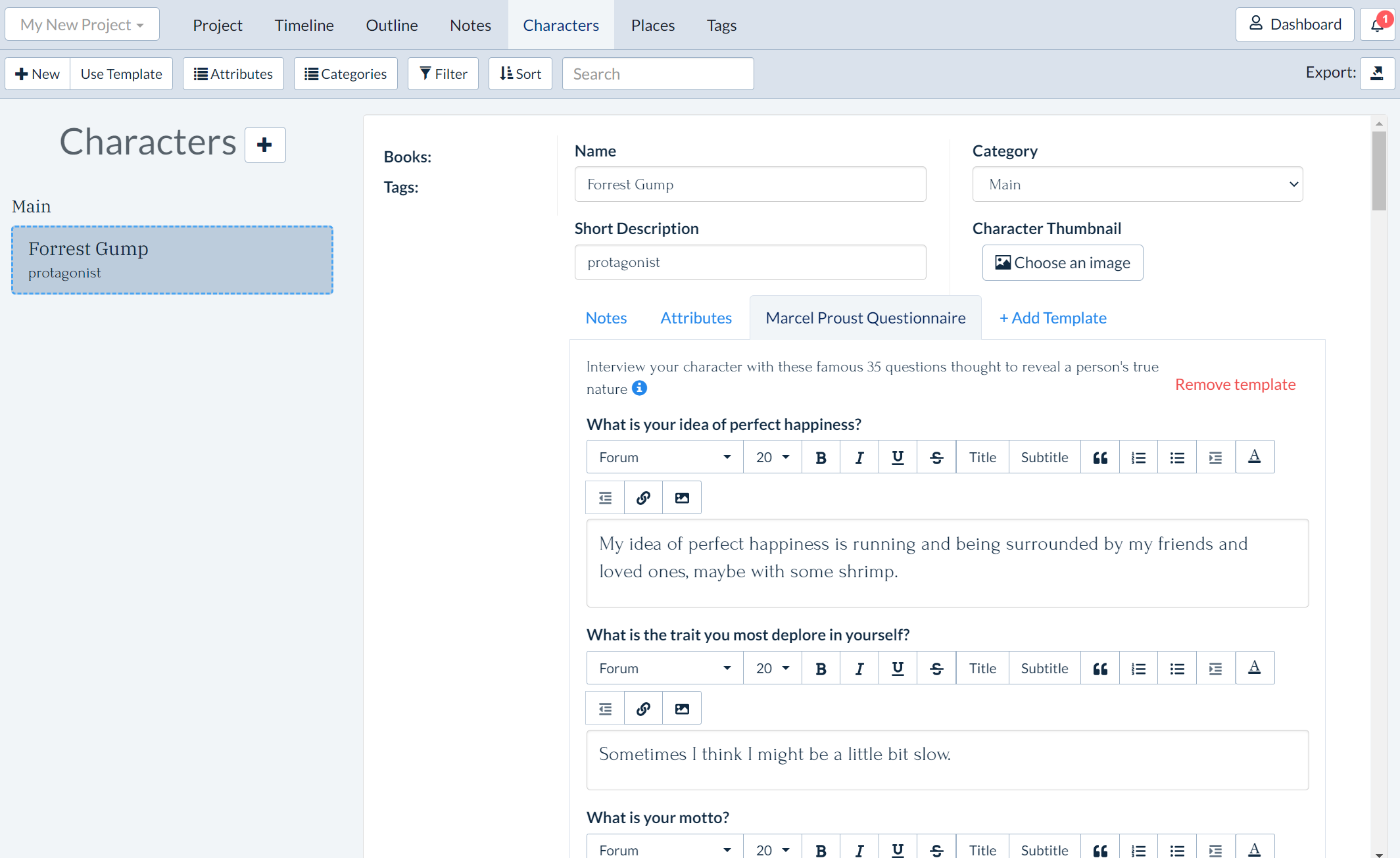
How to Use Plottr’s Marcel Proust Questionnaire Character Template
Ready to begin interviewing your characters? First, you’ll need to purchase Plottr or sign up for a free trial.
Once you have Plottr set up on your computer, follow these simple steps to add the Marcel Proust Questionnaire template to your character profile and begin writing:
-
- Step 1: Open Plottr and start a new project (or open an existing one)
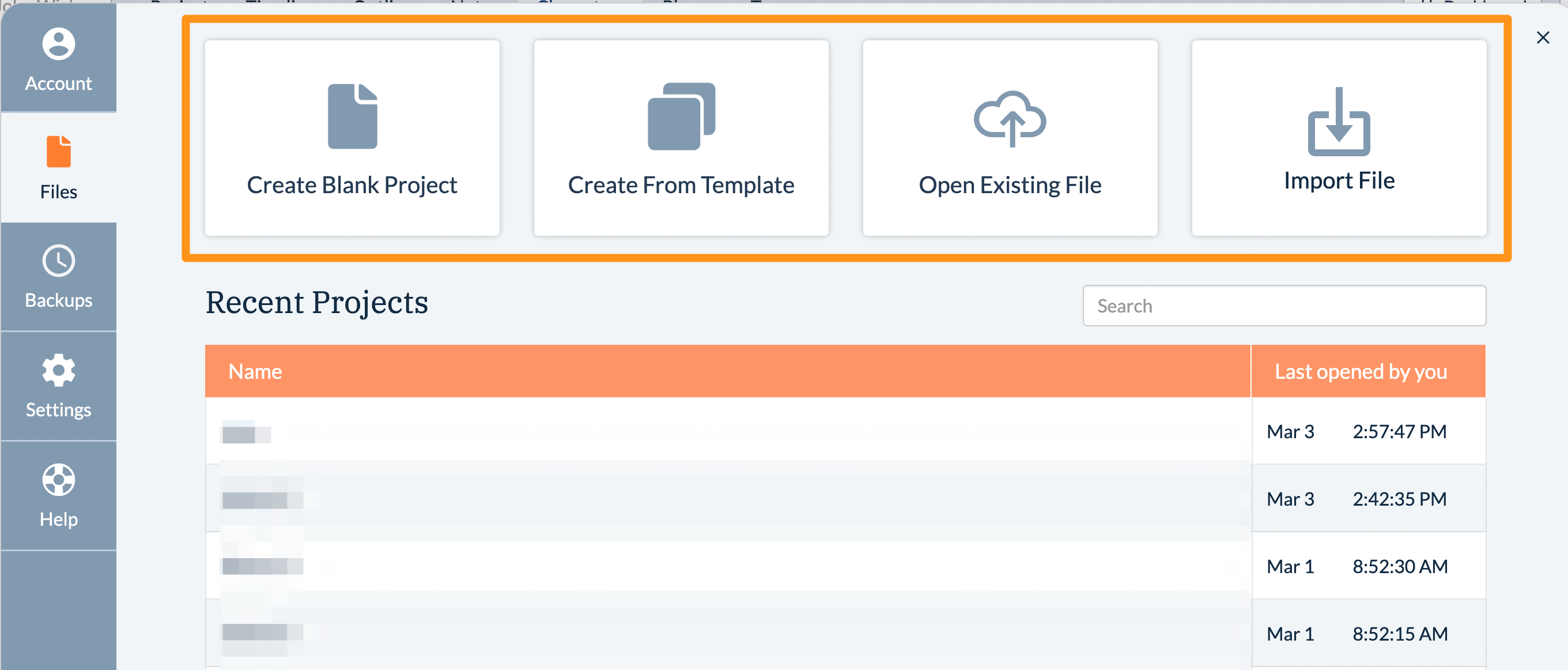
-
- Step 2: Click the Characters tab and create a new character profile (or open an existing one). Then, click the +Add Template tab
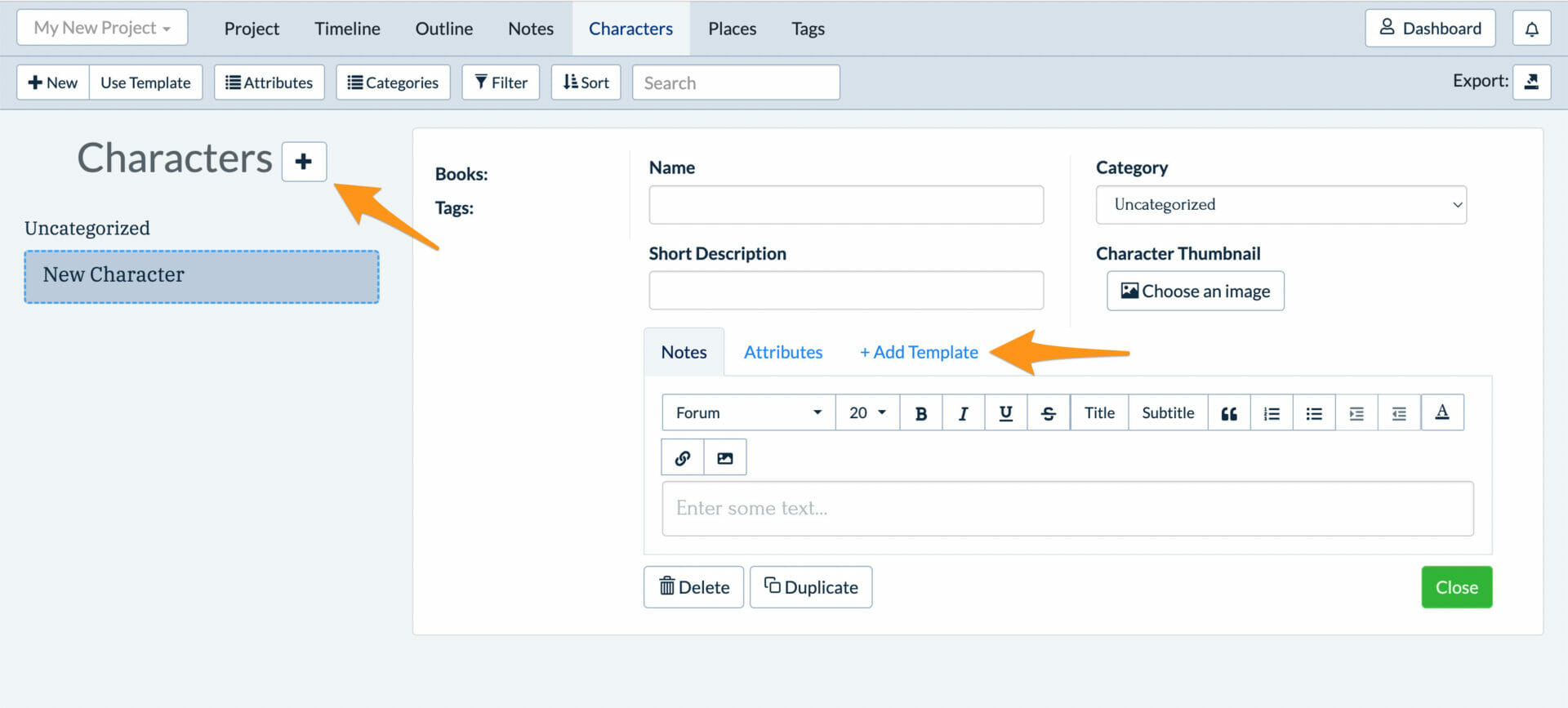
-
- Step 3: Select the Marcel Proust Questionnaire template from the list and click the Choose button to add it to your character’s profile

-
- Step 4: Fill in the answer to each question as you imagine your character would
Super simple! You can also use this template with others in Plottr. To add more depth to your character, consider exploring these templates, too:
Know Your Characters’ Minds with Confidence
Plottr’s Marcel Proust Questionnaire Character Template is a valuable tool for creating nuanced, fully developed characters. Asking character interview questions will help you uncover your ensemble’s deepest desires, fears, and motivations.
Don’t have Plottr yet? Sign up for a free trial now and bring your best ideas to life.
Have you tried the template? Let us know what you think in the comments below!
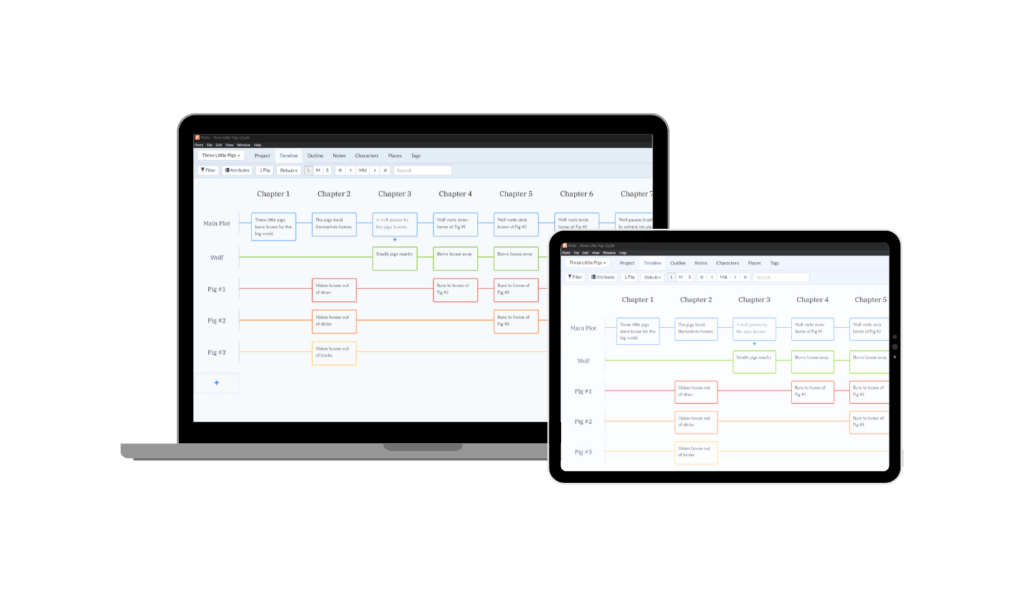

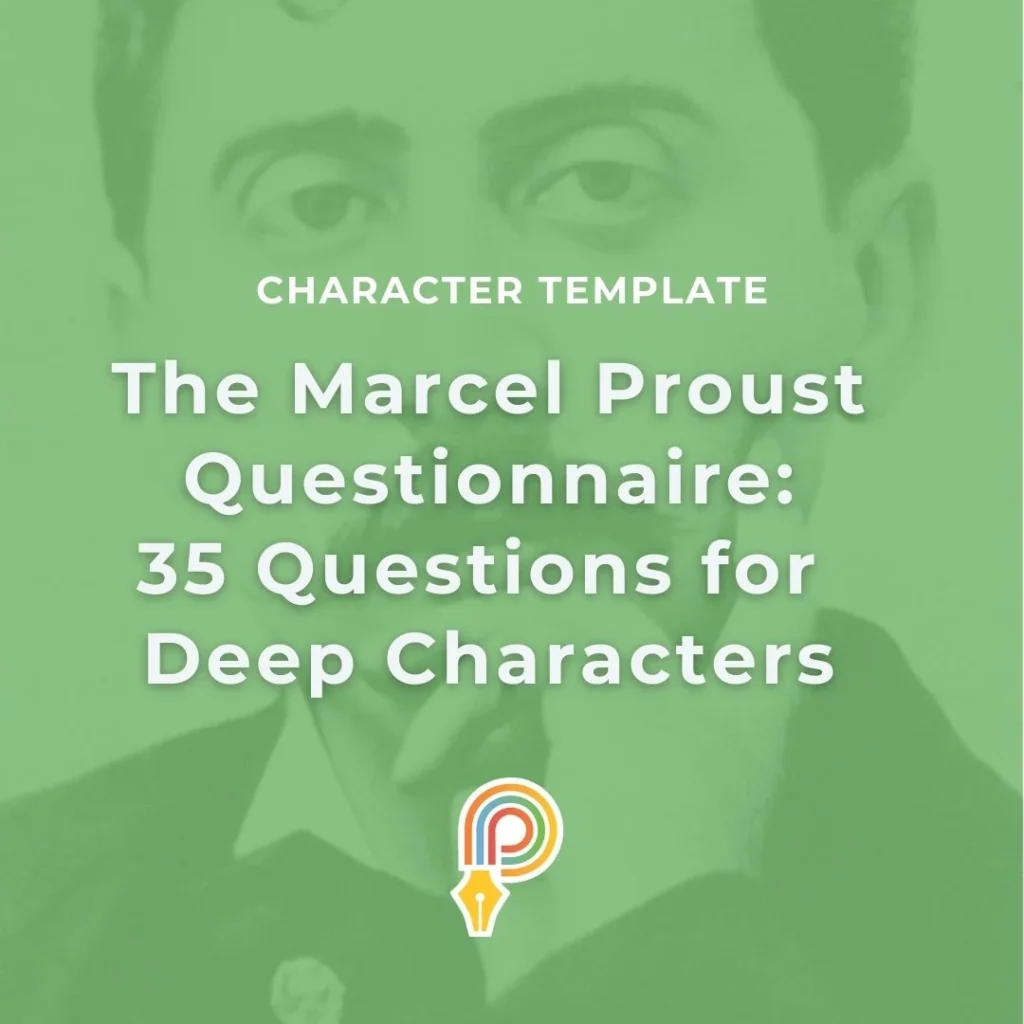


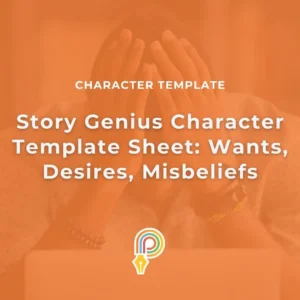
Comments